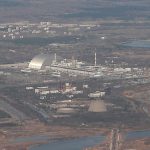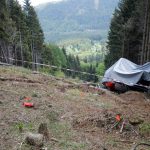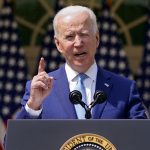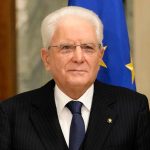It is hard, as one follows the war in Ukraine, not to be struck by a paradox.
On the one hand, this looks and feels like a traditional war, bound by national borders, fought by troops from two sides. Ukrainians combat Russian invaders; bombs rain down, citizens flee the terror. It is depressing, but also in some senses depressingly familiar.
But in another sense this war marks a real watershed, for there is also something quite novel happening. Even as troops fight, supplied in some cases by foreign powers (another staple from 20th-century warfare) a parallel conflict is happening invisibly, a conflict we have not quite seen before. Perhaps the best way to describe it is as an economic war.
Ukraine news live: Putin ‘has failed and is moving towards Plan B’
It is understandable that for the time being most attention is focused on what is happening on the ground in Ukraine. The death and destruction occurring each day in Mariupol, Kyiv and elsewhere is heartbreaking.
Economic weapons are less dramatic than physical artillery, but make no mistake, this other, parallel war could in the long run be just as if not more damaging and consequential as what we are seeing on the ground.
At this stage it is worth taking a step back and pondering what economic war actually means. For it is not as if the tools being used by the US and Europe – a combination of sanctions, tariffs and regulations – have not individually been used before.
FBI names Russian hackers wanted for targeting nuclear energy plants
JK Rowling cited by Vladimir Putin as he accuses the West of ‘trying to cancel’ Russia
Ukraine War Diaries
Read more: Responding to punishing sanctions, Putin attempts to swing his own financial sword
There have been plenty of financial sanctions against businesspeople and politicians; Russia is not the only country to have been banned from the SWIFT financial messaging network; and other companies have been stripped of their most favoured nation status, making them pariahs in the global trading system.
But, and this matters, never before have such measures been imposed in tandem, at such speed, and upon such a significant economy.
Russia is not as rich as its G7 counterparts but its economy is nonetheless sizeable – about the same size as Spain. It is a nuclear power. It has an outsize importance when it comes to the global supply of certain commodities – most notably oil and gas, fertilisers, nickel and wheat.
There are three consequences: first, these are sanctions of an order – in terms of their scale – that go beyond anything we’ve seen before. Second, they will cause damage to both sides. Third, as Adam Tooze, an economic historian at Columbia University, said, Russia is a dangerous country to do this to.
“The most direct analogies in terms of sanctions are Iran, Venezuela, North Korea – but Iran is the one that really stands out,” he said. “But for me one of the terrifying aspects of this moment is that the sanctions against Iran are to prevent Iran from becoming a nuclear power.
Read more: Why the EU is nervous about imposing a ban on Russian oil and gas
“Whereas what we are doing here is applying those styles of sanctions to the number two nuclear power in the world… that I think makes it one of the more dangerous moments in history.”
Most striking of all was the decision by the US, Europe and their allies to ban Russia from using their foreign reserves held in Europe and the US. It is hard to overstate the significance of this. While something similar happened to Iran, it has never happened to as big an economy as Russia, with as big a pile of foreign reserves.
Reserves – a stockpile of money and gold – are typically used by nations as a kind of insurance policy to protect them from future financial crises.
It is worth noting the history of this briefly, since as you will see there are deep implications to what we are currently witnessing.
Back after the Asian crisis, where many countries were bailed out by the International Monetary Fund and then faced harsh conditions to those emergency loans, a lot of nations vowed never to endure such a thing again and began to build up piles of these reserves, national savings.
The idea was that if they ever faced a similar crisis they would have the wherewithal to deal with it themselves.
The upshot is a lot of countries around the world have large foreign reserves, with the biggest by a long way being China. Russia has been building up its reserves for some years.
But many of those reserves were in dollars and euros held at central banks in Europe and Washington. The decision to freeze those reserves meant that overnight Russia’s ability to pay bills in dollars and euros was obliterated. In the following days the Russian currency, the rouble, collapsed.
For Francis Fukuyama, an American political scientist who has written extensively about international relations, this represents a new front.
“I don’t think that anyone has frozen central bank reserves in the way that Western countries have with Russia’s reserves, he said. “That really is a new use of financial power – it’s quite unprecedented. And it sets a potentially dangerous precedent because it may motivate other countries to not keep their reserves in western banks.”
According to Francesco Giumelli, an associate professor in International Relations at the University of Groningen and an expert on sanctions: “That is certainly beyond anything people have done before. This is something we did not do in World War Two with Germany.
Follow the Daily podcast on Apple Podcasts, Google Podcasts, Spotify, Spreaker
“It also counters the experience that we had with sanctions in the past 20 years. Since the mid or late ’90s, we started to think of targeting sanctions – going after individuals responsible for certain actions, and leaving aside the population or innocent civilians. But going after the reserves of the central bank is going after everyone.”
The impact on Russians is not only limited to direct sanctions. In the wake of the invasion numerous companies from Apple to Visa to Mercedes and McDonald’s have pulled out of Russia, something which is again unprecedented in its scale and severity. That, said Mr Giumelli, raises the question of what the goal of the sanctions really is.
“Is it: we want to weaken the Russian economy to the point that it’s either unable to be a danger? There’s this discussion of bringing Russia to the stone age by not selling technology and making sure that it’s unable to perform these actions again in the future. So there is indeed a war logic being applied at the moment.”
But there is another prism through which one should view this economic war: energy. For even as Europe imposes unprecedented sanctions and restrictions on its neighbour, another important thing is flowing as freely as ever before.
In fact, the amount of natural gas flowing in pipelines from Russia via Ukraine and the Baltic into Germany and its neighbours actually rose to the highest level so far this year.
It is worth contemplating this for a second. Even as it starves Russia of euros, Europe is still funnelling enormous amounts of money to companies associated with Vladimir Putin.
For some this will seem baffling; for others it is simply the way the world works; it is simply realpolitik. Nonetheless, it is a fact that right now homes and businesses throughout Central Europe are being heated by molecules of gas coming from a country upon which they have declared economic war.
This underlines a pragmatic issue. For all the wise words from Germany, France and beyond about reducing their reliance on Russian fossil fuels, for the time being these promises remain just that.
It will take many years to develop the alternative energy sources needed to wean Europe off Russian gas. For that gas is not just heating homes: it is helping power the industries which produce the majority of European physical goods.
It is providing the raw material we turn into the fertilisers which we sprinkle on our European fields. For the time being at least, those flows are continuing – and neither side wants to talk much about their dependence on each other.
The other question is what economic war spells for the economic world we live in. For some years, businesspeople have talked about a change in tide. They have warned that in the coming years globalisation – the easy flow of goods from one country to another – could change forever.
Laurence Boone, chief economist of the OECD, said: “Since the late ’80s and early ’90s we were living in a world of beneficent globalisation, where we were sharing experiences, technology, increasing each other’s expertise and relative comparative advantage and most people benefited from it – one-third of the planet was lifted out of poverty.
“If we’re more fragmented, if we conform less with each other than there’s less innovation and yes this in turn may lead to a period of more stable, less buoyant growth than we have seen and this exchange of technology and information.
“So it’s a balance between resilience and security on the one hand, and innovation and buoyant growth on the other one. And the balance may have changed with this.”
For Fukuyama, who became famous after writing an essay, “The End of History” about the consequences of the fall of the Berlin Wall, the implications, while far-reaching, may not necessarily be wholly negative.
“I actually think that there is an optimistic outcome that could emerge from this because of the unity of Western democracies, because of the success that the Ukrainians had resisting this Russian attack,” he said.
“But even if things do work out reasonably well, I do think the world is going to be different because the degree of risk that people have recognised – strategic risks that exist in the world – is not going to go away.
“Even if in the short run, the Russians are forced to back down, that has a lot of consequences for the way we regard globalised trade and our dependence on other countries.”






















